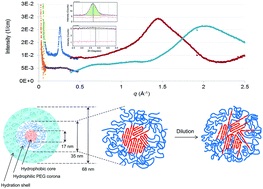Understanding the internal structure of nanospheres can give clues to effective drug delivery
Nanospheres are often regarded as little homogenous balls with a readily recognizable size. This study shows that some nanospheres have a layered structure such that the size depends on the layers that are included in the measurement, and provides a detailed view of the complex internal organization that changes with concentration and pH.
Researchers at the New Jersey Center for Biomaterials have combined three major analytical approaches to studying the core-shell structure of nanospheres formed from an ABA triblock copolymer with PEG as the hydrophilic end blocks. The central hydrophobic block was composed of oligomers of alternating monomers desaminotyrosyl-tyrosine octyl ester (DTO) and suberic acid (SA). Two degrees of polymerization were studied.
The team used small-angle neutron scattering (SANS); small-, medium-, and wide-angle x ray scattering (SAXS, MAXS, WAXS); and differential scanning calorimetry (DSC) to examine various concentrations of the nanospheres in phosphate buffered solution. When they combined data from the different sources the researchers made conclusions about the interaction of core and shell, estimated the size of each, and observed that hydration of the shell increases its size, affecting molecules in the core and confirming that nanospheres are in a constant state of flux.
It is well known that when a nanosphere core is formed during self-assembly it can incorporate drugs. However, it is not clear how drugs are released from the hydrophobic core and transported through the hydrophilic shell. The NJCBM team’s report on structural changes in the nanosphere is useful for understanding the release process, thus providing strategies for designing nanospheres to release drugs at desired rates.
http://pubs.rsc.org/en/content/articlelanding/2018/sm/c7sm02472j#!divAbstract
